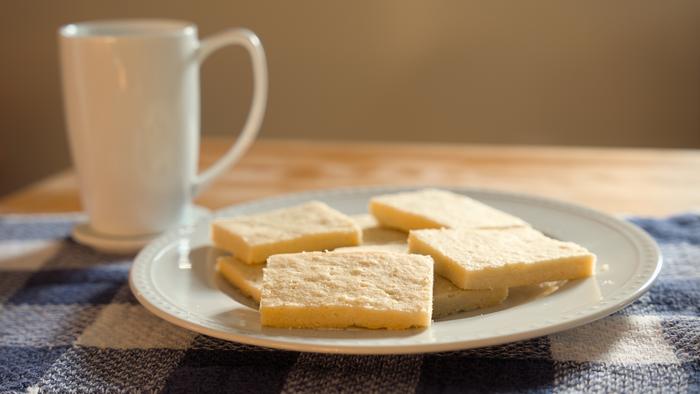WASHINGTON, March 25, 2025 – The quest for the perfect butter substitute has long preoccupied bakers, particularly those who are lactose intolerant or adhere to a vegan diet. Traditional dairy butter, an essential component in countless baked goods, presents challenges for those seeking to replicate its unique qualities without the dairy. In a recent innovative study published in Physics of Fluids by AIP Publishing, a research team from the University of Strathclyde investigated the rheological properties and sensory experiences associated with various vegan butter alternatives, utilizing Scottish shortbread as a benchmark to evaluate their findings.
Butter, a staple in the baking repertoire, is renowned for its approximately 80% fat content, which contributes significantly to the texture and flavor profiles of baked goods. However, for many, the challenge lies in finding plant-based substitutes that can mimic both the consistency and cooking qualities of traditional butter. This study aims to address this issue by scrutinizing the properties of those vegan alternatives, specifically looking at how their varying fat contents influence the baking process and the end product.
Central to the investigation was the realization that some commonly available vegan butters exhibit disconcerting differences in consistency compared to their dairy counterparts. Juliane Simmchen, a contributor to the study, shared her initial skepticism upon purchasing these alternatives, noting that they did not visually or texturally resemble traditional butter. This observation sparked a series of experiments aimed at understanding the physical properties of vegan butters and how they perform in practical baking scenarios.
The research team selected three distinct vegan butter substitutes, each varying in fat content, to explore their behavior during the baking process. The unique fat compositions directly impact how the dough interacts with heat and moisture, which in turn affects the final structure and mouthfeel of the baked product. This systematic comparison provided crucial insights into which vegan alternatives could stand up to dairy butter in traditional recipes.
After conducting laboratory tests on the physical properties of these butters, the researchers moved to the sensory realm. They organized a thorough tasting session, inviting a cohort of volunteers to sample shortbread biscuits made with both traditional dairy butter and the three vegan alternatives. This comprehensive sensory evaluation was aimed at identifying which vegan butter produced the closest replicate of the beloved shortbread cookie.
The results of the taste test were telling. The tasting panel unanimously favored the vegan butter with the highest fat content, which performed remarkably well in mimicking the texture and flavor of traditional butter. Simmchen noted that this particular substitute produced a dough that behaved similarly to dairy butter, leading to a delightful, crumbly, and flavorful biscuit. On the flip side, the alternative with the lowest fat content failed to impress the testers, resulting in a dough that was described as too doughy and less crumbly, which in many cases did not bake well.
This research suggests an essential guideline for those looking to explore vegan butter options in their baking. When seeking a suitable alternative to traditional dairy butter, bakers should prioritize vegan options that closely mirror the fat content of butter, as this is a critical factor in achieving optimal results in flavor, texture, and consistency. Simmchen’s study underscores the significance of understanding the science behind these alternatives and their applicability in traditional recipes.
Simmchen herself has been inspired by these findings and advocates for inclusive baking practices that allow for greater participation. Her experiences reflect a growing trend towards accommodating dietary restrictions and preferences, reinforcing the belief that baked goods should be accessible to all. With the increasing popularity of plant-based diets, the culinary world is evolving, and recipes are adapting to fit this new narrative.
Simmchen emphasizes that although she enjoys traditional Scottish shortbread, she is inspired to innovate her family recipes using plant-based ingredients. The goal is not only to provide delicious treats but also to foster an inclusive environment where friends and family with dietary restrictions can enjoy baked goods together. This sentiment resonates strongly in modern baking, where sharing delectable treats can bridge dietary gaps among loved ones.
The implications of Simmchen’s research extend far beyond the kitchen. As culinary preferences shift, industries must respond to these emerging trends with new product innovations and formulations. Understanding the science of vegan alternatives equips consumers with the knowledge needed to make informed choices, ultimately promoting greater inclusivity and diversity in dining experiences.
As bakers and chefs experiment with vegan alternatives, they contribute to a greater dialogue about health, sustainability, and dietary inclusivity in the food industry. Research like this not only enhances consumer understanding of these products but also facilitates the development of better options that meet the needs of a diverse customer base.
This exploration of vegan butter alternatives and their application in traditional baking underscores a pivotal moment in both food science and culinary arts. By harnessing data-driven insights into the behavior of these substitutes, bakers can achieve results that pay homage to traditional recipes while embracing modern dietary practices. Creating a delicious vegan Scottish shortbread may be closer than many realized, thanks to the contributions of contemporary research.
In conclusion, the journey toward mastering vegan baking continues to evolve as researchers systematically explore the properties of plant-based ingredients. This study advances the understanding of how vegan butter alternatives perform in traditional baking contexts, providing valuable guidelines for both professional and home bakers. With the findings from this study in hand, the future of inclusive baking looks promising, ensuring that delicious cookies can be enjoyed by all, regardless of dietary preferences.
Subject of Research: Examining the properties and performance of vegan butter substitutes in baking.
Article Title: Rheology and sensorial properties in traditional and plant-based (vegan) shortbread.
News Publication Date: March 25, 2025.
Web References: doi.org/10.1063/5.0255346
References: Physics of Fluids
Image Credits: Avery Thompson/AIP
Keywords
Vegan butter, baking, Scottish shortbread, dairy alternatives, food science




